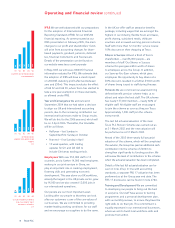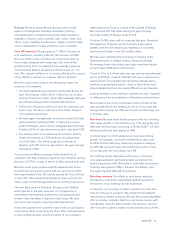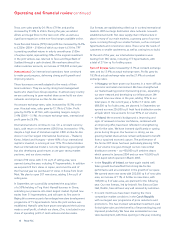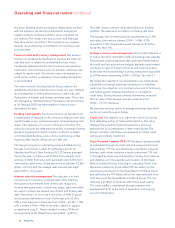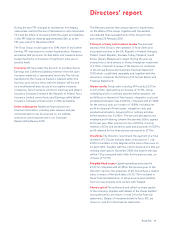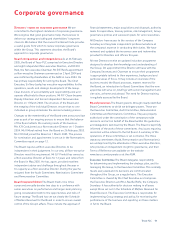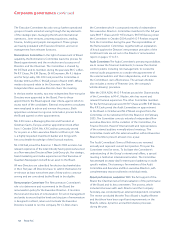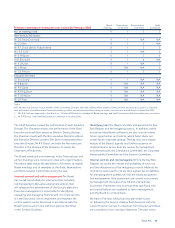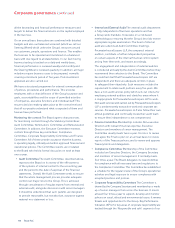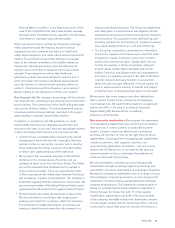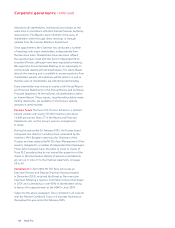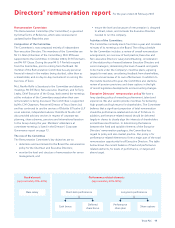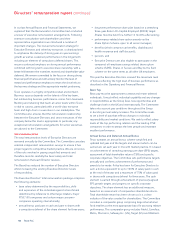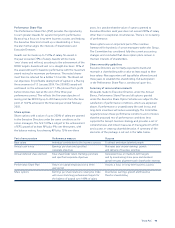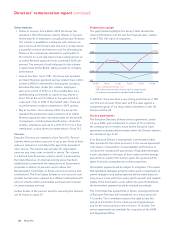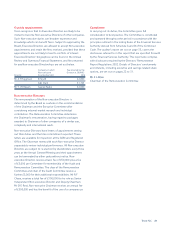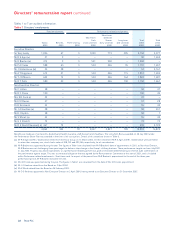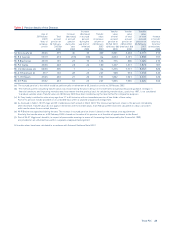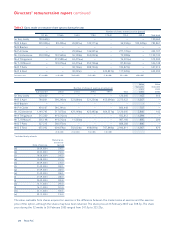Tesco 2005 Annual Report Download - page 16
Download and view the complete annual report
Please find page 16 of the 2005 Tesco annual report below. You can navigate through the pages in the report by either clicking on the pages listed below, or by using the keyword search tool below to find specific information within the annual report.14 Tesco PLC
Corporate governance continued
all the key trading and financial performance measures and
targets to deliver the financial returns on the capital employed
in the business.
On an annual basis these plans are combined with detailed
budgets and also our balanced scorecard (which we call our
Steering Wheel) which unites the Group’s resources around
our customers, people, operations and finance. This enables
the business to be operated and monitored on a balanced
basis with due regard to all stakeholders. In our fast moving
business trading is tracked on a daily and weekly basis,
financial performance is reviewed weekly and monthly and
the Steering Wheel is reviewed quarterly. In addition, all major
initiatives require business cases to be prepared, normally
covering a minimum period of five years. Post-investment
appraisals are also carried out.
We have a structured programme for internal communication
of policies, procedures and performance. This provides
employees with a clear definition of the Group’s purpose and
goals, accountabilities and the scope of permitted activities
of companies, executive functions and individual staff. This
ensures decision-making takes place at the correct level and
that all our people understand what is expected of them and
how we have performed.
Monitoring the controls The Board agrees clear processes
for monitoring controls through the Statutory Committees:
Audit Committee, Nominations Committee and Remuneration
Committee. In addition, the Executive Committee monitors
controls through three key committees: Compliance
Committee, Corporate Responsibility Committee and Finance
Committee. All of these provide assurance that the business
is operating legally, ethically and within approved financial and
operational policies. The Committee reports are circulated
to the Board who hold a formal discussion on each at least
once a year.
•Audit Committee The Audit Committee, described above,
reports to the Board on its review of the effectiveness
of the systems of internal control for the accounting year
and the period to the date of approval of the financial
statements. Overall, the Audit Committee seeks to ensure
that the whole management process provides adequate
control over major risks to the Group. This is achieved
through consideration of regular reports from internal and
external audit, alongside discussions with senior managers.
It should be understood that such systems are designed
to provide reasonable, but not absolute, assurance against
material mis-statement or loss.
•Internal and External Audit The internal audit department
is fully independent of business operations and has
a Group-wide mandate. It operates on a risk-based
methodology so ensuring that the Group’s key risks receive
appropriate regular examination. The head of internal
audit also attends all Audit Committee meetings.
PricewaterhouseCoopers LLP, the company’s external
auditors, contribute a further independent perspective
on certain aspects of the internal financial control system
arising from their work, and report accordingly.
The engagement and independence of external auditors
is considered annually by the Audit Committee before they
recommend their selection to the Board. The Committee
has satisfied itself that PricewaterhouseCoopers LLP are
independent and there are adequate controls in place
to safeguard their objectivity. Such measures include the
requirement to rotate audit partners every five years. We
have a non-audit services policy which sets out criteria for
employing external auditors and identifies areas where it
is inappropriate for PricewaterhouseCoopers LLP to work.
Non-audit services work carried out by PricewaterhouseCoopers
LLP is predominantly transaction work and corporate tax
services. PricewaterhouseCoopers LLP also follow their own
ethical guidelines and continually review their audit team
to ensure their independence is not compromised.
•Finance Committee Membership includes Non-executive
Directors with relevant financial expertise, Executive
Directors and members of senior management. The
Committee usually meets twice a year. Its role is to review
and agree the Finance plan on an annual basis; to review
reports of the Treasury policies; and to review and approve
Treasury limits and delegations.
•Compliance Committee Membership of the Committee
includes two Executive Directors, the Company Secretary
and members of senior management. It normally meets
four times a year. The Board delegates its responsibilities
for compliance with all necessary laws and regulations to
the Compliance Committee. This Committee has established
a schedule for the regular review of the Group’s operational
activities and legal exposure to ensure compliance with
accepted practices and policies.
•Corporate Responsibility Committee The Committee is
chaired by the Company Secretary and membership is made
up of senior managers from across the business. It meets
at least four times a year to support, develop and monitor
policies on social, ethical and environmental issues. It reviews
threats and opportunities for the Group. Key Performance
Indicators (KPIs) for key areas of corporate responsibility are
tracked through the ‘Responsible and safe’ segment of our


